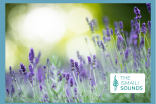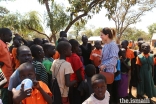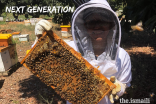Content Tagged with app
The Ismaili is pleased to present Naya Din (New Day) performed by Fitoor the Band, inspired by the occasion of Navroz. The song describes the natural beauty of the spring season and encourages us all to keep this beauty alive for generations to come.
To coincide with Navroz, The Ismaili is pleased to present a collection of songs in various languages in the days leading up to Navroz. The first one is entitled The Light of Navroz, which highlights that although we might be celebrating separately, we remain united as One Jamat.
Next weekend, the Jamat around the world will celebrate Navroz, marking the beginning of a new year and the first day of spring. The Ismaili TV is pleased to present a two-day Navroz programme featuring programmes in multiple languages for children and adults alike.
On 21 March 2020, as nation after nation succumbed to the largest lockdowns of our time, Mawlana Hazar Imam issued a directive to establish a Covid-19 Global Task Force and Steering Committee to coordinate the Jamati and Aga Khan Development Network (AKDN) response to the novel coronavirus outbreak.
Last March, the World Health Organization declared the coronavirus outbreak to be a global pandemic. After 12 months of mixed emotions and disruption to our lives, what have we learned, and where do we go from here?
This week, on the third episode of The Ismaili TV’s Trailblazers, we are joined by Latif Nasser, the host and executive producer of the Netflix documentary series ‘Connected: The Hidden Science of Everything’, and host of two podcast series’. He received a PhD in the history of science from Harvard University and is the recipient of the 2021 duPont Columbia Award for his series ‘The Other Latif’.
Art historians and enthusiasts often recognize the 10th through 13th centuries as a period that marked an increase in the usage of symmetrical, geometric patterns in the Muslim world. Most likely aided by Muslim mathematicians, artists and artisans produced a large variety of designs. Many of these geometric models developed interpretations of ornament that embody metaphysical intent.
The Ismaili is pleased to present Ya Ali, Ya Ali, a song in praise of the first Imam. The video was filmed in the Canadian Rocky Mountains, among scenery of snowy peaks, evergreen trees, and crystal clear lakes, reminding us of the beauty of the natural world.
Nine Ismaili nurses and midwives have been honoured in the World Health Organization’s 100 Outstanding Nurses and Midwives list, in recognition of their vital role in providing health services. Throughout their careers, they have worked to promote women’s health and empowerment in their respective regions and beyond.
Farah Williamson’s story is multi-faceted. As a 10-year-old girl, she had to flee her home country, Rwanda, during the 1994 genocide. Today, Farah is the co-founder of Project Shelter Wakadogo, a not-for-profit school in Gulu, Uganda. Farah speaks about these experiences and more in the second episode of The Ismaili TV’s original series Trailblazers.
The complex challenges facing our increasingly volatile world — from climate change to rural development to security — are also a source of opportunity for the next generation of leaders and changemakers. Around the world, young Ismailis like Rufayda Dhamani, Nurmuhammad Butabekov, and Aleem Rehmtulla are taking creative approaches to address these issues and prepare for the future of the global economy.
With the rapidly changing world we find ourselves in, individuals and families are having to face an ever-fluctuating economy and changing patterns of employment. Yasmin Jetha, a non-executive director of the NatWest Group Plc, the Nation Media Group in East Africa, and the Guardian Media Group in the UK, shares her thoughts on navigating these changes and working towards long-term economic empowerment.
Over the last decade, digitalisation has disrupted finance across developed and emerging markets, giving rise to an explosion of financial technology — otherwise known as “fintech” — startups and platforms, impacting every aspect of finance, starting with access, availability, and affordability.
Trailblazers, a new original series airing exclusively on the Ismaili TV, will showcase Ismaili professionals from around the world who have demonstrated excellence in their respective fields.
Many aspects of our daily lives can cause stress and coping with these stresses is an important element of maintaining our mental wellbeing. One of the leading causes of stress is financial circumstance. Many people are dealing with job loss, increasing debt, and unexpected expenses, especially during this time of uncertainty. Here are five tips to assist you in coping with financial stresses.
To coincide with the occasion of Yawm-e Ali, The Ismaili is pleased to present Hum Hai Ghulam-e Ali, a devotional composition in praise of Hazrat Ali.
Whether through film, design, or other media, the arts allow individuals to express themselves and their communities, and remake the world at large through their work.
The Ismaili is pleased to present a rendition of Durood O Salam, a much-loved composition, originally performed by Kamal Taj, for the occasion of Mawlana Hazar Imam’s visit to the United States Jamat in 1986.
The Covid-19 pandemic has put economies around the world to the test. Unemployment has reached alarming levels, many industries have seen massive declines in revenue, and business models once thought reliable were disrupted. Surviving these circumstances required building new skill sets, adjusting career plans, and revising business strategies at an unprecedented pace. Inspiring stories have emerged of Ismailis who met these challenges with resilience as well as community institutions that stepped up to support the Jamat through times of hardship.
Despite recent advancements in science and technology, there is still much to discover and accomplish to improve lives across the globe. Women and girls continue to play a leading role in this regard, not least via the sciences, while members of the Ismaili community are at the forefront of this field, working to better understand our world and make it a better place for us all.























